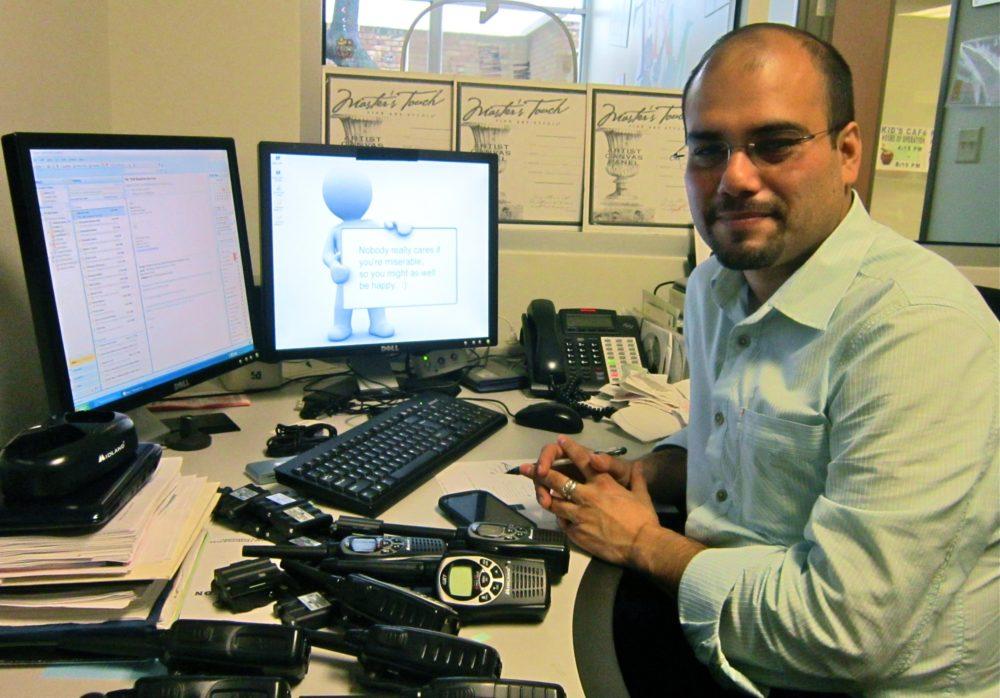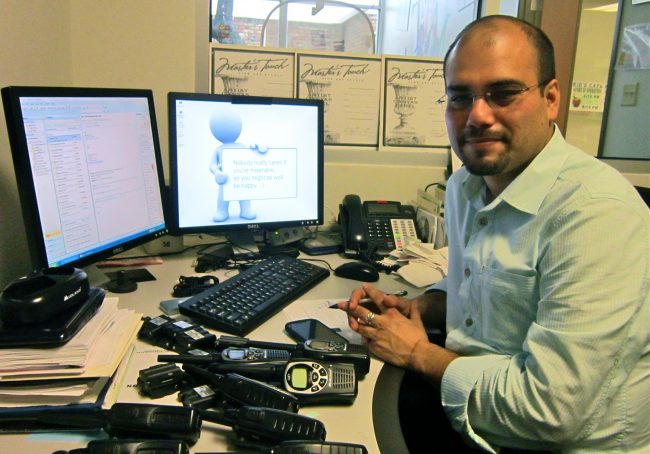
(Sarah Kramer/The Daily Campus)
He remembers his father pulling him aside when he was 14 to discuss the benefits of moving their family of six to the United States.
An illegal immigrant who had frequented Texas throughout the ’70s, his father believed the U.S. would offer more opportunities for his children. But when the family packed up their bags and headed for the U.S. in 1989, the parents and two oldest children admitted they weren’t sure leaving Nuevo Laredo Tamaulipas, Mexico was the best move.
Today, Rafa, 37, is reluctant to share the hardships he has encountered during his 22 years in the U.S. As he sat in his office at Trinity River Mission, he chose to talk about his love for technology and how he was the first family member to graduate from both high school and college.
He shied away from describing the hostility he received from his extended family upon moving to Texas because he didn’t know a word of English. Instead, his first adversity was tackling the same issues any high school student in the ’90s was facing at L.G. Pinkston High School, a school that today is ranked as the fourth worst school in Texas.
“In just one day I was involved in two fights,” he said.
Rafa was born in the U.S., but didn’t even live here a full year before his mother and father decided to go back to Mexico to raise him. There, his two younger sisters and younger brother were born. After the youngest child, Jose, was born, the Reyes’ realized they wanted their children to receive a better education than what Mexican schools could offer. So, the family returned to the U.S.
While Rafa is distant, his younger sister makes up for his reserved nature and is willing to shed light on the battles he has had to overcome. Her first memory in Houston, a temporary stop with family before moving to West Dallas, is watching her cousins stereotype and discriminate against her older brother, 14 at the time, and sister, 10.
“They were called wetbacks because they didn’t know English,” Alma said, “by our own family.”
Though she admits she wasn’t old enough to understand, she could tell her parents and siblings were burdened by the experience.
“Yeah, we all struggled, but it wasn’t particularly easy for Rafa and Melissa,” she said. “But I admire my older siblings.”
Once the Reyes’ settled in West Dallas in the ’90s, it didn’t take them long to realize there was a great deal of racial tension between the Hispanics and African Americans. Rafa especially noticed this as he began his high schools years at Pinkston High School.
“Officers would walk the hallways and stay outside because it was so dangerous,” Rafa said. “The school didn’t even care if you graduated.”
While the school’s goal was to keep violence to a minimum, his parents’ priority was making sure he was making good grades.
“My father said my job is school,” he said. “And, my biggest fear was my mother thinking I was skipping class.”
Rafa’s parents didn’t have the opportunity to go to school in Mexico. Thus, education has always been a priority. But upon arriving in West Dallas, the Reyes’ were exposed to an overwhelmingly large amount of drugs and crime.
“It was bad, very different,” Rafa’s mother Alicia, 55, said in Spanish. “The main reason we came to the U.S. was for my kids to get an education. But it was very sad to see my kids crying because they wanted to go back to Mexico.”
In Mexico, Rafa’s father owned his own upholstery business. They lived in a big, beautiful house with both a front and backyard. The main difference between their old life and new life was that Mexico was still safe in the ’80s and ’90s.
“It was before the drug wars had started,” Alicia said. “But here in Dallas, my kids were exposed to drugs and worse things.”
Alicia worried that her children would become involved in gangs or drugs, or that her daughter’s would add to the growing statistic of teen mothers.
“If you grow up here, you go one way or another,” Alma said. “But you can grow up in West Dallas and still come out a good egg.”
To ensure they stayed on the right path, each Reyes child focused on an extracurricular activity. For Rafa, it was his fascination with technology.
“At first college wasn’t an option,” he said referring to the lack of motivation he received from Pinkston High School. “It didn’t matter if I graduated from high school.”
But as Rafa’s interest in technology grew, his father found ways of encouraging good grades from him in an attempt to make college a priority.
“If I asked my dad for a jukebox or a radio he would say, ‘Bring me the grades. You make an effort and I’ll make an effort.’ “
Aside from their parents constantly asking how their grades were, or if their homework was finished, the four Reyes children attended after school tutoring programs at Trinity River Mission, a nearby volunteer based community learning center.
TRM was more than just an educational service for them, though.
“It was a home away from home,” Alma said. “It encouraged me to study and allowed me to be social.”
Alma admitted she was never outgoing. She preferred to read and play piano.
However, when she was about seven or eight she convinced her parents to let her spend the night with a friend.
“It took a lot of convincing, and she was my BFF,” Alma said.
The Reyes parents were hesitant to let their children out of their sight, especially at night, because of gang violence and drive-by shootings. All the children had been warned about weapons, and were told to inform a parent if they ever encountered one.
But when Alma found a gun during her sleepover, she was paralyzed, unable to grab it befor
e her friend retrieved it first.
“Fortunately it didn’t go off, but it scared me,” Alma said. “I was scared to go out and I was more aware of the drive-bys. But drive-bys and shootings made us to want to be better, do more.”
Alma hasn’t shared this experience with many people. She told her mother and father, but was hesitant to tell her friends because many of them had guns in their home.
Being the oldest child, Rafa felt he had to set an example for his younger siblings. In 1994, Rafa graduated from high school and headed to Stephenville, Texas where he enrolled at Tarelton State University, a move the other three children would make in just a few years.
When asked how his college experience was, he said it took him five and a half years to obtain his bachelor’s degree in education.
And, he got a little taste of country music while he was there.
“Oh you know, I’d listen to a little Garth Brooks,” he said. “Everyone knew country.”
When talking to Rafa, he gives the impression that his college life was a breeze: he had graduated from high school third out of 168 students; he had mastered the English language; and, he was growing more familiar with technology. Yet, he never admitted he struggled.
“He slept in a car because he didn’t have a place to stay,” Melissa said as Rafa looked down, unable to look his sister in the eye.
When Rafa’s father suffered his second stroke in 1999, during his final year in college, making ends meet intensified.
“It hit me hard. It hit us all hard. He needed special care,” Alma said.
The family had to make some adjustments but was able to manage. Then, in Alma’s first year at Tarelton, she found out her mother was suffering from a spinal cord injury and was confined to the hospital.
With their father unable to help, Jose still in high school, and Alma two hours away, the oldest two children were critical in keeping the family together.
“Rafa took on the roll of the provider. I know it was hard on him but we never talk about it,” Alma said, looking away for the first time.
As her face became flushed and eyes began to fill with tears, she said it was hard for her to be away when she knew her family needed to be together.
“I still get choked up about this,” she said. “But through it all, Rafa just said, ‘All you have to worry about is school.'”
Though their father’s stroke has disabled him in many ways, one thing still makes his eyes light up – talking about his children’s success.
In the Reyes family house, the same one they have lived in since moving to West Dallas, there is a sacred wall. The scared wall, which is in the living room, showcases nearly every diploma, certificate, deans list and presidents’ list each child has achieved. Alma, 25, said her father was upset when she told him she needed to keep her therapy certificates in her office.
“Every time I feel sad or discouraged, I’ll go stand in front of the wall,” Rafael Reyes, 60, said holding back tears. “I feel like a turkey when it’s all fluffed because that’s how proud I am.”
West Dallas has transformed since the Reyes’ put Rafa’s high school diploma on the wall, but more changes are about to come.
Since 2006, investors have been knocking on the Reyes’ door offering to buy their house.
Investors and contractors anticipate the revitalization of what is now a poverty-stricken neighborhood with the opening of the Margaret Hunt Hill Bridge. In an attempt to commercialize the area and replace the homes along Singleton Boulevard with bars and restaurants, investors continue to frequent the Reyes’ household, offering money for their property.
And, though the offer has skyrocketed from $50,000 to nearly $300,000 in six years, the answer from the Reyes’ remains the same – no.
“My father jokes that the only way he will sell his house to the investors is if they offer him a bigger house with a bigger wall so he can hang all of our awards,” said Melissa, who is now working as a systems engineer.
With the opening of the bridge last month, Rafa has seen a decrease in drug use and an increase in police patrol within the past few months.
“What’s the point in having a nice bridge when it’s going to nothing?” he said. “It’s a transformation, and we want it to be better, too.”
As he sat nestled between two laptops and two computers, Rafa, the current director of operations at Trinity River Mission, was interrupted by half a dozen children asking if they could play on the computer.
Each time his answer was the same.
“Are you using it for homework? Or, are you going to play games and get on Facebook?”
He knew the answer. Despite what the 7 to 12 year olds said, they would not be using it for homework. Yet, he nodded his head ‘yes’ each time because he knows there are worse things they could be doing.









